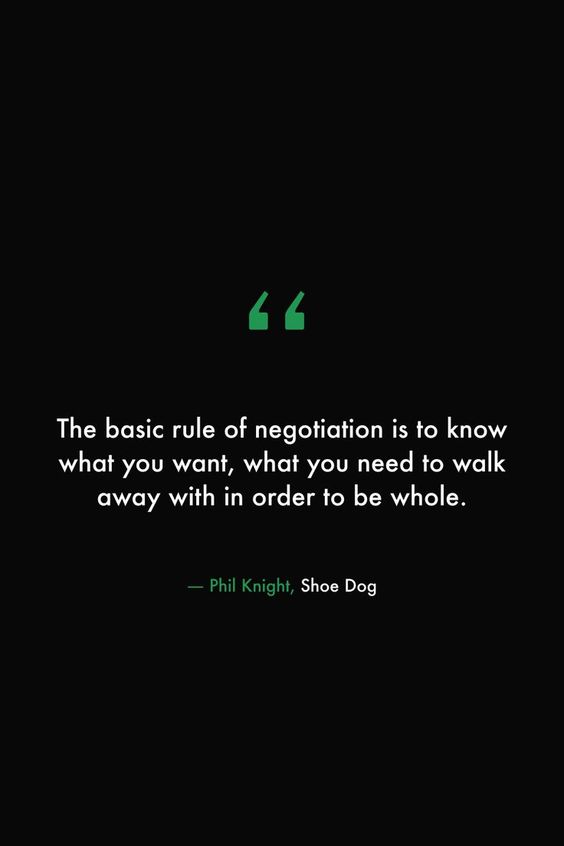How to persuade? Learn one of the most powerful arts: the art of negotiation.
Well, negotiation is a word that can either get your adrenaline pumping or make you break into a cold sweat.
Whether you’re trying to close a business deal, buy a new car, or convince your roommate to finally take out the trash, negotiation skills are essential.
The good news is, anyone can master the art of persuasion and develop convincing power with a little bit of strategy and a lot of practice.
Let’s break it down into seven key tips on how to negotiate like a pro in no time.
1. Begin With a Definite Goal
One of the biggest mistakes people make when negotiating is not having a clear goal.
Imagine going into a football game without knowing where the end zone is.
Not a winning strategy, right? Whether you’re negotiating your salary, the price of a new house, or who’s doing the dishes tonight, always start with a concrete objective in mind.
For example, if you’re negotiating a raise, know exactly how much you’re asking for.
Is it a 10% increase? A specific number? Whatever it is, nail it down.
When you walk into a negotiation knowing what you want, you’re already in a stronger position.
This gives you direction plus convincing power and helps avoid aimless back-and-forths that waste time and energy.

2. Have a Mental Map of the Situation
Excelling the art of negotiation requires getting your homework done.
Before you walk into any negotiation, it’s essential to understand the landscape.
This means having a clear idea of the factors at play, the interests of the other party, and the potential outcomes.
For instance, if you’re negotiating a deal with a client, take the time to understand their pain points.
Are they primarily concerned with price? Delivery time? Quality? When you map out the situation in advance, you’re better equipped to steer the conversation in a direction that works for both parties.
It’s like going into a road trip with a GPS—sure, you could wing it, but why make things harder?
3. Learn to Listen for Details
How to persuade before you even formally get started in a negotiation? Listen!
Listening is one of the most underrated negotiation skills.
We often get so caught up in what we’re going to say next that we forget to truly listen. But here’s the thing: the other person will usually tell you exactly what they want, if you’re paying attention.
Let’s say you’re haggling over the price of a used car.
The seller might mention, “I really need to sell this quickly because I’m moving next week.” Bingo! That’s a detail you can use to your advantage.
You now know they’re in a hurry, which means they might be willing to drop the price for a quicker sale. Listening carefully helps you pick up on these cues and adjust your strategy accordingly.

4. Grasp Where They Are Coming From
Learning how to negotiate effectively can never be successful unless you have empathy!
Empathy is a powerful tool in negotiation.
If you can understand the motivations and concerns of the person across the table, you’re much more likely to find common ground.
For example, if you’re negotiating with a landlord, and you know they’re hesitant to lower rent because they’ve had bad experiences with previous tenants, addressing those concerns directly can work wonders.
Maybe you offer to sign a longer lease to give them security, or suggest paying a higher security deposit to ease their worries.
The key here is putting yourself in their shoes and addressing the underlying fears or needs.
5. Avoid Conflict and Seek Win-Win
If you truly want to learn how to negotiate, chant this phrase “winning the battle but losing the war!”
In negotiation, the goal isn’t to bulldoze the other person into submission. Instead, aim for a win-win outcome where both parties walk away feeling like they got something valuable.
For example, if you’re negotiating a project timeline with a client, and they’re pushing for an unrealistic deadline, don’t just say “no” flat out.
Instead, propose a phased approach—maybe you can deliver the most critical components first and then follow up with the remaining work.
This shows you’re committed to their needs while still being realistic about what can be done. Conflict only breeds resentment, but compromise builds long-term relationships.

6. Never Make Assumptions
That is how to negotiate your salary!
Assumptions are the enemy of good negotiation.
Just because someone seems firm on a point doesn’t mean they won’t budge. People are often more flexible than they appear, especially when you approach the conversation with the right tactics.
For instance, if your boss says, “We can’t afford raises this year,” it’s easy to assume the conversation is over.
But instead of walking away, try asking questions like, “Is there flexibility in benefits or additional vacation days?” or “Could we revisit this conversation in six months?”
By not assuming the first response is the final word, you keep the door open for new possibilities.
7. Don’t Lose Your Grace!
Sometimes, negotiations get heated, and it’s easy to let emotions get the better of you.
But, to learn how to develop negotiation skills, you first need to learn how to control your mind, your emotions.
Indeed, losing your temper or becoming defensive can derail the entire process and damage relationships.
Let’s say you’re in a salary negotiation, and your employer counters with a lower offer than you expected.
Instead of snapping back or taking it personally, stay calm and professional. Politely explain why you believe your ask is fair, and provide concrete examples of your contributions to back it up.
Keeping your grace under pressure not only shows maturity, but it also gives you the upper hand in difficult conversations.

Conclusion
Honestly, you might consider this blog a little value-packed art of negotiation course, isn’t it?
Learning how to develop negotiation skills is all about strategy, empathy, and staying level-headed. With these seven tips, you’ll be well-equipped to navigate even the trickiest situations with ease.
Remember: begin with a clear goal, map out the situation, listen carefully, and always seek a solution that benefits everyone involved.
And most importantly, don’t lose your cool—because at the end of the day, the best negotiators are those who can keep their grace, even when the stakes are high.
So the next time you find yourself in a negotiation, whether it’s at the office or at the dinner table, use these tips to get what you want—and make it look easy while you’re at it!
P.S. Feel free to learn in more depth about the art of negotiation on the official Tony Robbins website.






